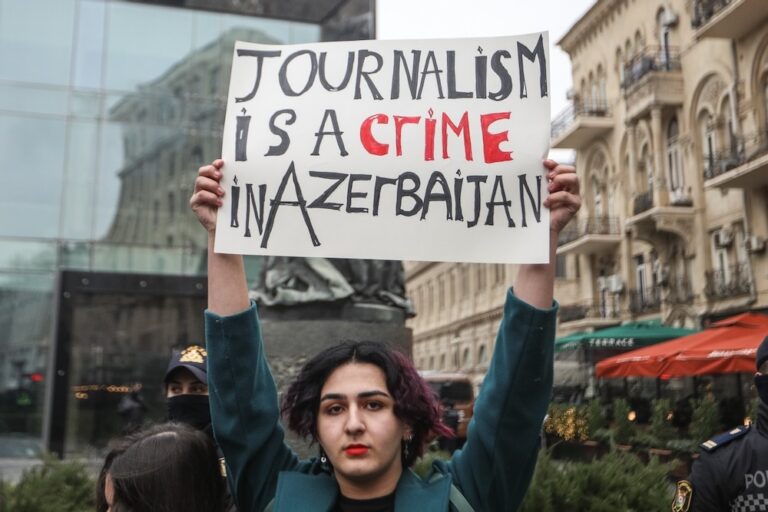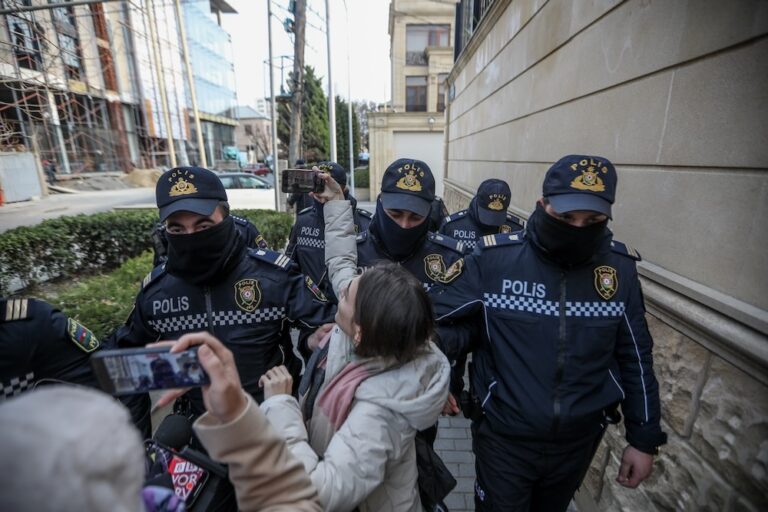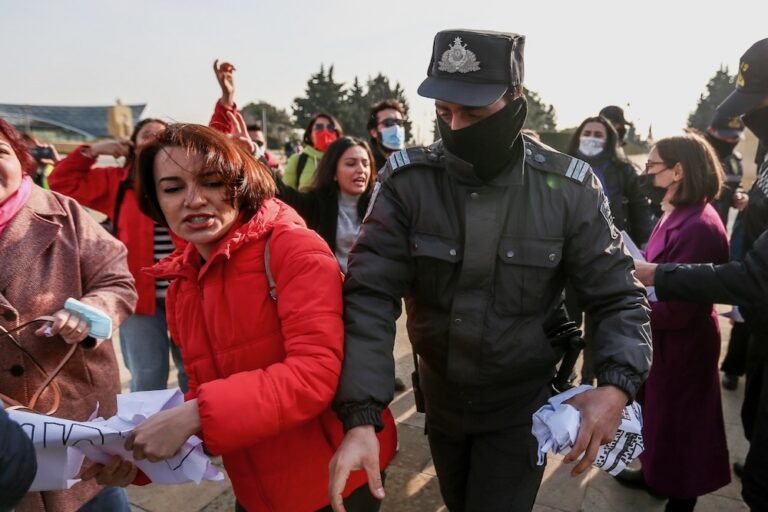The Presidential Administration of Azerbaijan has removed provisions on The Draft Law on Protection from Defamation, which include the repeal of criminal code provisions providing for heavy penalties for defamation and determine the maximum amount of compensation for damage caused by defamation.
The Institute for Reporters’ Freedom and Safety (IRFS) and Media Rights Institute (MRI) are dismayed that the reform of Azerbaijan’s ‘chilling’ defamation laws to prevent authorities from silencing their critics risks being derailed. Both organizations call on the government to remove defamation provisions from the criminal code and reform other media legislation to ensure it complies with international standards for press freedom.
The defamation reform, which has recently been threatened with obliteration after the law makers decided to extend criminal defamation to the Internet, is once again under attack, now by presidential administration officials who have clandestinely have taken down key clauses of the bill designed to boost freedom of speech.
IRFS and MRI are dismayed that instead of the previous draft of the bill designed in cooperation with civil society institutions and OSCE Office in Baku, the watered down version was presented to the Venice Commission for technical review.
The Draft Law on Protection from Defamation was developed in cooperation with civil society institutions in 2012 at the initiative of OSCE and presented to the Presidential Administration of Azerbaijan Republic. The text of the bill submitted to Venice Commission for approval in September of 2012 was not made public until May 22 of 2013.
Comparative analysis of the bill, presented by civil society to the Presidential Administration (PA), and the bill that the PA submitted to the Venice Commission shows that the government has dramatically watered down the bill behind close doors. As such the following provisions, that stipulate the repeal of criminal code provisions providing for heavy penalties for defamation (and insult) and determine the maximum amount of compensation for damage caused by defamation, have been removed from the defamation bill submitted to the commission:
Article 2. The Legislation of the Republic of Azerbaijan on Protection from Defamation
2.3. None of the provisions of this Law shall be interpreted as restricting the rights, freedoms and guarantees protected by the Constitution of the Republic of Azerbaijan, international treaties ratified by the Republic of Azerbaijan or generally recognised rights, freedoms and safeguards relating to freedom of expression.
Article 14. Damage Awards
14.2. Where the court determines that a correction and/or reply is not sufficient to redress the harm done to the plaintiff in the form of moral damages, the court may order the respondent to pay compensation for this to the plaintiff. The amount of compensation for moral damage shall not exceed the amount of the compensation awarded for other types of civil violations (infringements). In any case, the amount of compensation for moral damage shall not exceed five times minimum wages.
Article 15. Impermissibility (prohibition) of criminal liability for defamation
15.1. The criminal liability for defamation in Azerbaijan Republic will be repealed upon entry into legal force of this Law.
15.2. The Articles 147, 148 and 323 of the Criminal Code of Azerbaijan Republic will be repealed upon entry into force of this Law.
Put simply, the authorities have deleted the clauses designed to guarantee the freedom to make uninhibited criticism of government officials.
These clauses are crucial. IRFS and MRI believe free speech will continue to be stifled if this part of the bill does not become law.
The defamation law must ensure full repeal of criminal liability for defamation (slander and insult) and must also accurately determine the scope of civil penalties in order to protect the freedom of expression against unjustified and inappropriate interference.
IRFS and MRI emphasize that the “Bill on Protection from Defamation”, submitted by the PA to Venice Commission for consideration by international experts, does not meet the above-mentioned requirements.
IRFS and MRI recall that there is a practice in Azerbaijan’s judicial system, where courts impose huge monetary penalties for defamatory contents referring to the articles 147, 148 and 323 of the criminal code, which serves as a tool to stifle the critical voice.
IRFS and MRI underline that existing defamation provisions provide for sanctions, which cannot be regarded as proportionate to the legitimate aim, and thus they are contrary to the Azerbaijani Constitution and the National Action Program to Raise Effectiveness of the Protection of Human Rights and Freedoms. Above all, these provisions are incompatible with the requirements of European Convention on Human Rights and the standards of the Council of Europe and European Court of Human Rights, and are therefore posing serious threat to the freedom of expression in Azerbaijan.
The UN Human Rights Committee, the independent body of experts that provides the definitive interpretation of the International Covenant on Civil and Political Rights (ICCPR), has said that ‘defamation laws must be crafted with care to ensure that they… do not serve, in practice, to stifle freedom of expression.… States parties should consider the decriminalization of defamation and, in any case, the application of the criminal law should only be countenanced in the most serious of cases and imprisonment is never an appropriate penalty’.
Azerbaijan is a state party to the ICCPR and is bound by its provisions.
The groundbreaking Council of Europe Parliamentary Assembly Resolution 1577 (2007) Towards decriminalization of defamation reads:
‘As established in the case law of the European Court of Human Rights (the Court), Article 10 of the European Convention on Human Rights (ETS No. 5) guarantees freedom of expression in respect not only of “information” or “ideas” that are favorably received or regarded as inoffensive or as a matter of indifference, but also of those that offend, shock or disturb’.
Azerbaijan is a member of Council of Europe and is bound by its provisions.
IRFS and MRI call on the Azerbaijani authorities to live up to the standards and commitments reflected in the European Convention of Human Rights, the Helsinki Accords, the International Covenant on Civil and Political Rights, and the Universal Declaration of Human Rights.
Toward that end, IRFS and IMS urge the government of Azerbaijan to repeal the laws that would constrict fundamental freedoms and human rights.
IRFS and MRI urge the government to submit the original version of the defamation bill to the Venice Commission, and also give legal effect to this law to prevent further restrictions of the right to freedom of expression. IRFS and MRI call on the Azerbaijani authorities to urgently amend the country’s law on defamation to make it conform to international norms on freedom of expression.
IRFS and MRI further call on the international community, in particular the OSCE as the initiator of developing the defamation bill, to react to this issue and exert pressure on the Azerbaijani government to adopt the defamation law drafted in cooperation with the civil society.


